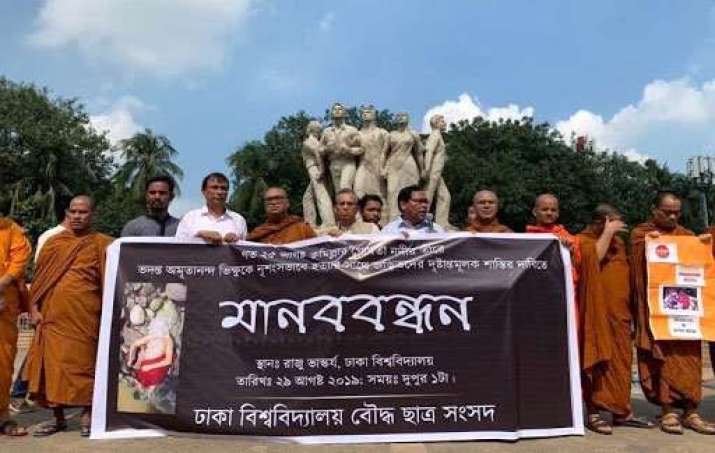NEWS
Human Chains and Protests Held in Bangladesh to Demand Justice for Killing of Buddhist Monk
 Dhaka University Buddhist Students’ Union organizes a human chain at the Anti-Terrorism Raju Memorial Sculpture on the Dhaka University campus. From dhakatribune.com
Dhaka University Buddhist Students’ Union organizes a human chain at the Anti-Terrorism Raju Memorial Sculpture on the Dhaka University campus. From dhakatribune.comBuddhists and human rights activists in Bangladesh formed human chains and protest rallies in different parts of the country, demanding the immediate arrest and punishment of the killers of Venerable Amritananda, the vice-principle of Gyanaratna Buddhist Monastery in Feni District in southeastern Bangladesh.
On 25 August, police found the body of Ven. Amritananda under a railway bridge on the bank of the Gomti River in Comilla District, some 100 kilometers southeast of the capital Dhaka. His throat had been cut. The protesters say that Venerable Amritananda might have been killed and his body dumped there while he was returning to Feni from Dhaka by train.
Dhaka University Buddhist Students’ Union and other religious organizations formed a human chain at Dhaka University’s Anti-Terrorism Raju Memorial Sculpture. Speakers at event said the brutal killing of the Buddhist monk was destroying country’s secularism. They also expressed worry for their lives and for security in the country.
“Attack on the Buddhist community is a matter of great sorrow as Bangladesh is a secular country and so is the incumbent government,” said Ven. Buddhananda, vice-president of the Buddhist Aid Foundation. “We demand an ultimate solution to such repeated attacks on the community in this non-communal country.” (Dhaka Tribune)
“Buddhist monks have dedicated their lives for mankind,” said Nirmal Rozario, president of the Bangladesh Christian Association. “The incident of killing Amritananda is intentional to keep the community and the country’s people under fear. The terrorist groups are trying to embarrass the government and make the country unstable.” (Dhaka Tribune)
The Alliance for Resistance of Terrorism and Communalism (ARTC) released a joint statement demanding justice for the murder. The statement asserted that the death of Ven. Amritananda was a planned act of communal terror and an attempt to create a destabilizing situation in the country.
“We are clearly in favor of humanity and world peace. We do not support any kind of communal harassment or bloodshed anywhere in the world,” said the leaders of the ARTC. “We think that a quick and proper investigation into the murder should ensure the trial and exemplary punishment of the killers. At the same time, the government and the public must be vigilant and careful so that no one can take any effort to end the communal peace of Bangladesh.” (Channel I Online)
The ARTC further said that while Bangladesh is passing through a deep crisis with the influx of Rohingya Muslim refuges from neighboring Myanmar, we are reminded of the sudden killing of the Buddhist monk. Two years ago, when the Rohingya Muslims came to Bangladesh after being persecuted in Buddhist-majority Myanmar, a group tried to attack the Buddhist community in Bangladesh over the incident. But the people of Bangladesh’s Buddhist community protested the wrongdoing of Myanmar’s rulers and extended humanitarian aid to the Rohingya Muslims.
“This is a manifestation of the secular democratic spirit of Bangladesh. There is no opportunity for the Buddhist community to take responsibility for the Myanmar incident,” the joint statement said. “Rather, at this time of the Rohingya crisis, the killing of an elderly Buddhist monk will confront us internationally.” (Channel I Online)
See more
Protest held demanding justice for monk Amritananda killing (Dhaka Tribune)
Justice for monk Amrita demanded (New Age)
Arrest killers of Buddhist monk (The Daily Star)
বৌদ্ধ ভিক্ষু হত্যা: জঙ্গিবাদ ও সাম্প্রদায়িকতা প্রতিরোধ মোর্চার নিন্দা (Channel I Online)
Related news from Buddhistdoor Global
Buddhist Monk Stands Firm Against Hatred and Violence in Myanmar
Bangladeshi Buddhists Call for Peaceful Solution to Rohingya Crisis
Spiritual Leaders Denounce Communal Violence in India
US Buddhists Call for a United Stand Against Injustice and Suffering
Related features from Buddhistdoor Global
Ramu Tragedy - Bangladesh Government and World Media
Sea of Suffering: The Rohingya and the Conundrum of Buddhist Terror
The “Yogyakarta Statement”: Guidelines for Religious Harmony and Communal Stability














